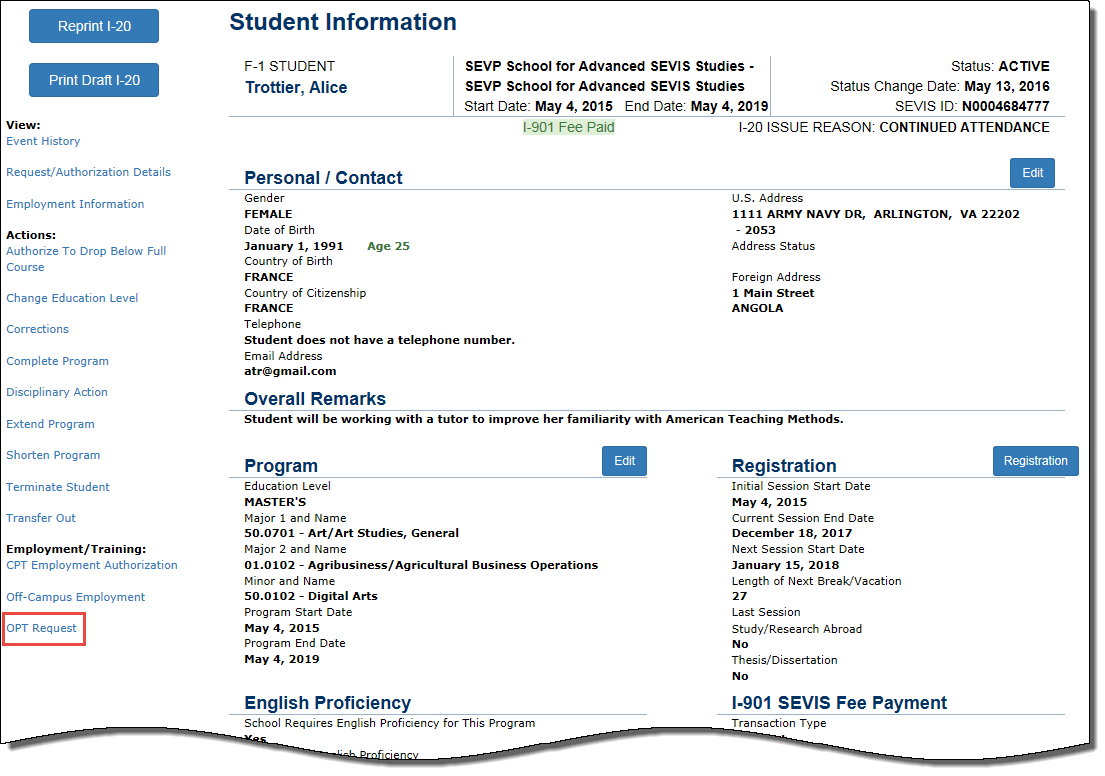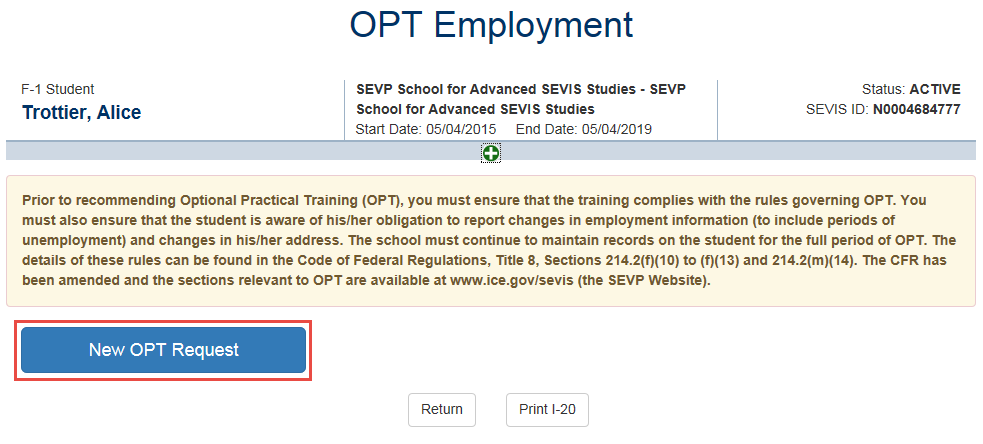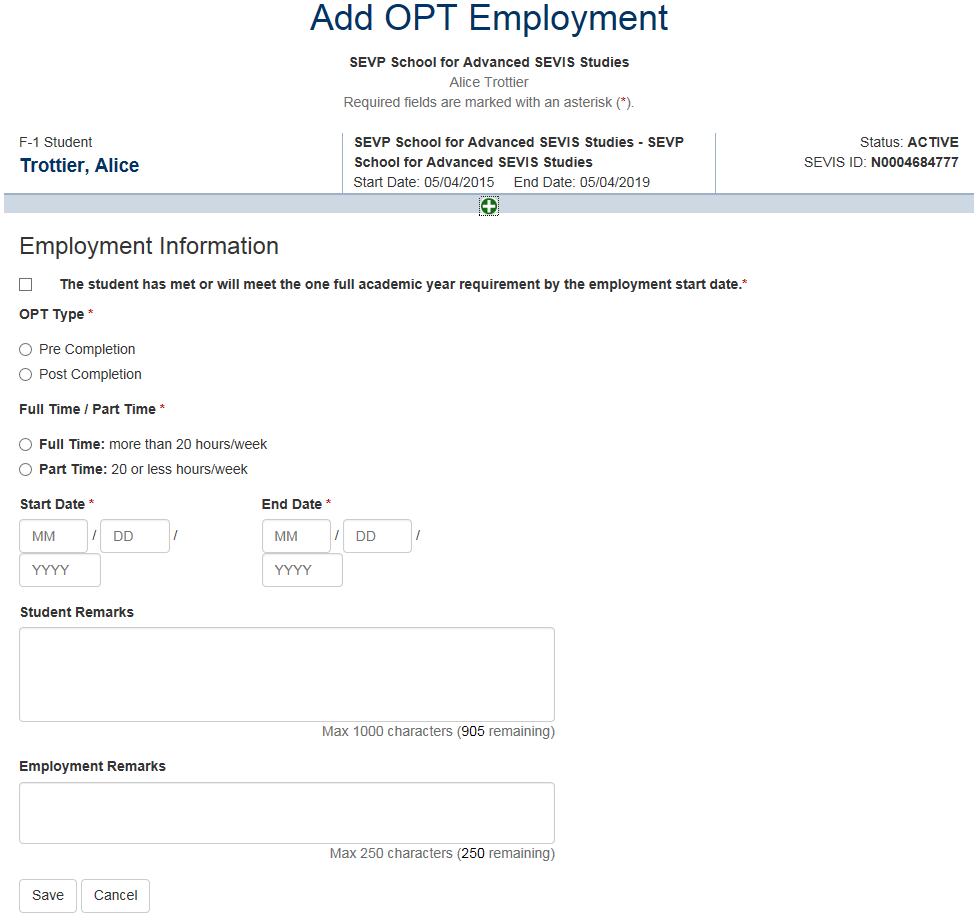Opt after the approval notice when receive the ead card

Official website of the Department of Homeland Security

SEVIS Help Hub
F-1 Optional Practical Training (OPT)
Breadcrumb
- Home
- SEVIS Help Hub
- Student Records
- F/M Student Employment
- F-1 Optional Practical Training (OPT)
F-1 Optional Practical Training (OPT)
Last updated: July 10, 2024
Quick Links:
- Overview
- Recommend Optional Practical Training
- Edit OPT Request
- Cancel/Withdraw OPT Request
- Report OPT Participation
- Post-completion OPT and Unemployment
- OPT-Related SEVIS Alerts and Lists
- View OPT Employment Information
- H-1B Cap-Gap Extension of OPT
- Correcting OPT Data: Correction Requests and Data Fixes
Expand All | Collapse All
Overview
F-1 students often want to work. However, employment opportunities are limited, and strict rules apply. This document discusses different types of optional practical training (OPT) including: required forms, processes, and updating SEVIS.
What is Optional Practical Training?
Optional practical training is one type of work permission available for eligible F-1 students. It allows students to get real-world work experience related to their field of study.
While a Designated School Official (DSO) recommends OPT in SEVIS, it is the student who must apply for the work permit with the U.S. Citizenship and Immigration Service (USCIS). If the OPT is approved, USCIS will issue an Employment Authorization Document (EAD). The student must not begin working before the start date on the EAD.
Regulations and Policy Guidance
Complex rules and guidance apply to OPT. Any OPT requests entered into SEVIS must comply with federal regulations. DSOs must understand the following regulations and policy guidance:
OPT Types
There are three general types of OPT:
For students engaged in post-secondary schools or at conservatories. Twelve months of Regular OPT is available for each higher level of study. (For example a student may have 12 months for a bachelor’s degree and another 12 months for a master’s degree.)
- Pre-Completion OPT: Any portion of OPT used before the student’s Program End Date. It may be part-time or full-time.
- Post-Completion OPT: Any portion of OPT used after the student’s Program End Date. It must be at least 20 hours per week or full-time.
OPT Request Statuses
The table below lists the statuses used to identify the stages of OPT requests in SEVIS.
| Status | Status Meaning |
|---|
| Requested | DSO requested OPT in SEVIS on behalf of the student, but USCIS has not yet received the Application for Employment Authorization (Form I-765). |
| Pending | USCIS has received the Form I-765. |
| Approved | USCIS has approved the Form I-765. |
| Denied | USCIS has denied the Form I-765. |
| Canceled | DSO or a scheduled SEVIS maintenance job canceled the practical training request in SEVIS. |
| Withdrawn | USCIS approved the student’s request to withdraw the Form I-765. |
OPT Eligibility
A student is eligible for OPT if:
- The student has been a full-time student for one academic year in an SEVP-certified:
- College
- University
- Conservatory
- Seminary
Full-time CPT at a previous school at the same program level counts toward the CPT 12month total affecting OPT. CPT at another program level does not affect OPT.
OPT Process at a Glance
Remind your F-1 students:
- Not to file the Form I-765, “Application for Employment Authorization,” until you have recommended OPT in their SEVIS records, and they have the updated Form I-20 with the OPT recommendation.
- They must file within the 30-day period after your DSO OPT recommendation.
If a student submits the Form I-765 on paper or electronically before you recommend the OPT or after the 30-day post-DSO recommendation period:
- USCIS will deny the application. (Federal regulations require the DSO OPT recommendation on the student SEVIS record before the Form I-765 is submitted.)
- The student will lose the application fee.
- The student will have to reapply for OPT and pay the fee again.
IMPORTANT: Making these mistakes can dramatically delay the final USCIS authorized OPT start date.

The OPT application process involves many players and several steps:
- DSO confirms eligibility, enters the request in SEVIS and issues the Form I-20.
- DSO signs the Form I-20 and gives to the student.
- Status of the OPT request in SEVIS immediately changes to Requested.
- Student signs the Form I-20.
- Student completes an Application for Employment Authorization (Form I-765). The Form I-765, fee, and supporting documentation must be filed with USCIS within 30 days of the DSO’s recommendation.
- Upon receipt of the Form I-765, USCIS issues a Receipt Notice (Form I-797) that contains the receipt number assigned to the case.
- Through an interface with USCIS, the status of the OPT request in SEVIS changes to Pending.
- If USCIS needs more information, the student will receive a Request For Evidence (RFE), which states what information is needed and the deadline for submitting it. The student must respond by the deadline.
- USCIS then makes a decision on the application:
- If the application is approved, USCIS issues an EAD and the OPT Request status in SEVIS changes to Approved.
- If the Form I-765 is denied, the OPT Request status in SEVIS changes to Denied.
- Student receives the EAD and can begin work once the authorized date arrives.
- When the student is hired, the student reports the employer information to the DSO.
Any F-1 Optional Practical Training request in Requested status longer than 180 days is automatically canceled by SEVIS.
Form I-765 Filing Deadlines Once DSO Requests OPT in SEVIS
If the student does not file a Form I-765, the DSO should cancel the OPT request in SEVIS.
Recommend Optional Practical Training
DSOs must be mindful of several key dates when entering OPT in SEVIS.
Key Dates
DSOs must be mindful of several key dates when entering OPT in SEVIS.

Post-Completion OPT Planning Tool: This Excel spreadsheet allows users to calculate the amount of OPT available for a student and generates suggested timelines for a student, based on the Program End Date and the desired OPT start date.
Recommend OPT
- SEVIS will not allow DSOs to request overlapping segments of OPT. You must specify if the OPT is pre-completion or post-completion OPT and must be either full or part part-time.
- DSOs should verify and, if necessary, shorten the program end date on the Form I-20 before recommending a student for post-completion OPT
- If a DSO is recommending OPT for a student who plans to split their OPT time between degree programs at the same education level, you should explicitly note in SEVIS that the student is requesting to split their OPT time. The requested OPT validity dates for each particular degree program should be limited to the planned duration of OPT for that program.
To recommend OPT:
1. Go to the Student Information page.

2. Click OPT Request. The OPT Employment page opens.

3. Click New OPT Request. The Add OPT Employment page opens.

4. Enter information relevant to the OPT authorization.
- Click the checkbox to indicate the student has met the enrollment requirement.
- This is a required field.
- Select either:
- Pre-Completion: All employment occurs before the Program End Date.
- Post-Completion: All employment occurs after the Program End Date.
- Select either:
- Part-Time: Select if Pre-Completion OPT occurs when school is in session.
- Full-Time: Select full-time if:
- Pre-Completion OPT occurs when school is not in session.
- Employment is Post-Completion OPT.
- The date that OPT authorization starts.
- This date cannot be before the student has completed one academic year of full-time study
- A student can split their OPT time between degree programs at the same education level (for example, they intend to use six months of OPT after completing a master of fine arts degree and the remaining six months of OPT after completing a master of music degree).
- The requested OPT validity dates for each particular degree program should be limited to the planned duration of OPT for that program. If the student would like to request less than the maximum validity period of post-completion OPT available for each degree program, you should explicitly note in SEVIS that the student is requesting to split their OPT time.
- If you initially request 12 months of OPT based on one degree program, the student will be unable to later request OPT based on a different degree program at the same education level.
Format: MM/DD/YYYY.
Post-Completion OPT: Start Date must be on or after the Program End Date. It cannot be more than 60 days after the Program End Date.
- This is a required field.
- The date the OPT authorization is to end.
- Pre-Completion OPT: Cannot be after the Program End Date.
- Post-Completion OPT: Cannot enter a date more than 12 months after the Employment Start Date.
- This is a required field.
Enter or update remarks regarding the student’s planned employment. Use this field to convey important information you think the student or government officials need to know. USCIS has noted they want to see how the planned employment relates to the student’s major course of study. For example: student will pursue training .related to studies.
This field is limited to 1,000 characters.
- Enter any applicable remarks about the student’s employment. This field is limited to 250 characters.
- These remarks do not print on the Form I-20.
5. Review the information. Click either Save or Cancel:
- Cancel: Returns to the OPT Employment page without saving.
- Save: Submits the OPT request. An Update Successful message displays.








